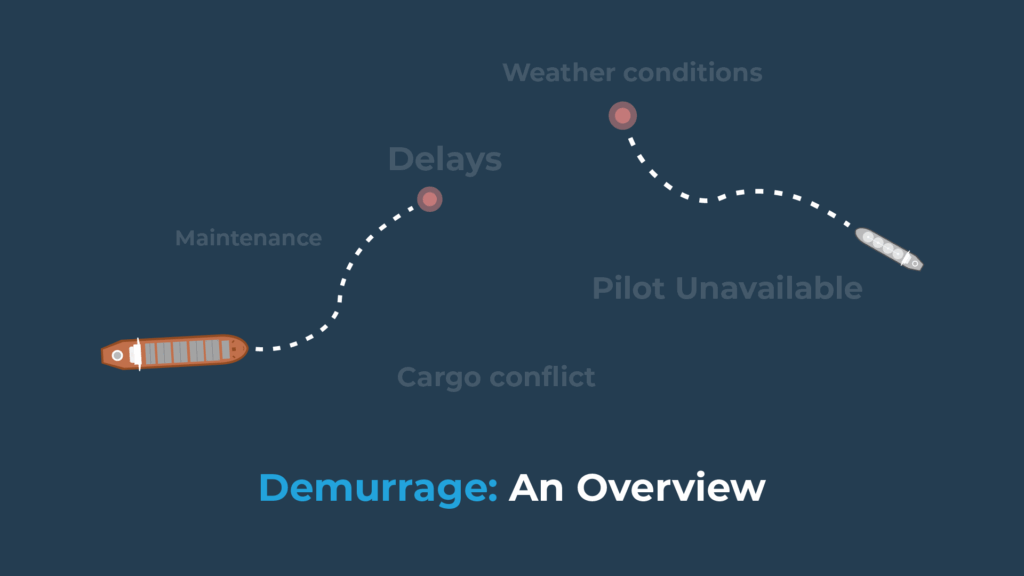- By TOP CHINA FREIGHT
- August 7, 2025
- Shipping
What is demurrage and why does it matter in global shipping? In international trade, delays at ports can lead to significant additional costs—demurrage charges. For importers, exporters, and freight forwarders, understanding the causes, consequences, and prevention of demurrage is essential to keeping logistics operations smooth and cost-efficient. This guide breaks down everything you need to know to stay ahead of these avoidable charges.

1.What Is Demurrage in Shipping?
Demurrage is a charge levied by shipping lines when cargo stays in a port terminal beyond the agreed-upon “free time.” This charge compensates the carrier for the use of their container while it is not moving or generating income.
In simpler terms, when a container remains at the terminal too long—either before it’s picked up by the importer or before it’s loaded onto a ship by the exporter—demurrage charges apply. These fees can build up quickly, affecting shipping budgets and causing disputes between buyers, sellers, and freight forwarders.
2.Why Is Demurrage Charged?
Ports and carriers rely on efficient container turnover. A container sitting idle at a terminal takes up valuable space and slows down logistics operations. Demurrage is therefore used:
- To discourage congestion at ports.
- To incentivize quick cargo pickup and delivery.
- To recover costs from underutilized equipment.
- To ensure container availability for the next shipper.
3.When Does Demurrage Occur?
Demurrage charges typically arise in two scenarios:
1. Import Demurrage
After a container arrives at the destination port, importers are given a limited number of “free” days to collect their cargo. If the cargo remains at the terminal after this free time, demurrage charges begin.
2. Export Demurrage
On the export side, once an empty container is delivered to the port by the exporter, there is also a free period before the vessel departure. If the container is not loaded on time, demurrage is charged for each extra day it occupies terminal space.
4.How Is Demurrage Calculated?
Demurrage fees are usually charged per container, per day. The actual rate depends on the shipping line, container type (20ft, 40ft, reefer, etc.), and the port location.
Demurrage is often tiered. For example:
| Days Over Free Time | Demurrage Rate (USD/day) |
|---|---|
| Day 1–3 | $100 |
| Day 4–7 | $150 |
| Day 8+ | $200 |
Charges can escalate rapidly, especially during port congestion or customs delays.
5.Key Factors That Cause Demurrage
Understanding why demurrage occurs helps avoid it. The most common causes include:
1.Delays in customs clearance
2.Incomplete or incorrect shipping documents
3.Late arrival of trucking services
4.Port congestion and labor strikes
5.Disputes between buyer and seller over payment or Incoterms
6.Warehouse unavailability or space issues
7.Failure to plan around weekends or holidays
6.Demurrage vs. Detention
| Term | Applies When | Charged For |
|---|---|---|
| Demurrage | Full container stays in the terminal after free time | Occupying port space |
| Detention | Container is out of the terminal but not yet returned empty | Delaying return of shipping equipment |
Demurrage happens in-port, while detention happens off-port.
7.How to Avoid Demurrage Charges
Use freight tracking tools to monitor container ETA and availability.
Pre-clearance helps release cargo faster upon arrival.
Don’t wait until the container arrives; schedule transport in advance.
Double-check shipping instructions, commercial invoices, and bills of lading before cargo is dispatched.
Each carrier has different policies; review contracts carefully.
Work with freight forwarders and customs brokers who have a strong track record of timely clearance.
8.Common Mistakes That Lead to Demurrage
- Assuming weekends don’t count: Some ports include weekends in free time calculations.
- Underestimating peak season congestion
- Overlooking holiday closures
- Failure to monitor container availability notices from the port
Conclusion
So, what is demurrage? It’s a critical part of shipping that, while often misunderstood, plays a key role in global logistics. While unavoidable in some cases, demurrage is mostly preventable with smart planning, contract clarity, and reliable supply chain partners.Whether you’re an importer, exporter, or freight forwarder, understanding how demurrage works—and how to avoid it—can protect your business from costly surprises.
Ask for a quote
Need Help Avoiding Demurrage?
TJ China Freight offers tailored solutions to help businesses of all sizes ship more reliably from China.
FAQs
Q1:Is demurrage always avoidable?
Not always. Strikes, weather, or unexpected customs inspections can cause unavoidable delays. But most demurrage stems from preventable issues like poor planning or documentation errors.
Q2:Do demurrage charges vary by country?
Yes. Demurrage policies and rates differ between shipping lines and ports. Some countries have stricter timelines and higher fees.
Q3:Can I negotiate for more free time?
Yes. Shippers with high volumes or long-term relationships can often negotiate extended free time or reduced demurrage rates in their contracts.
Q4:What happens if I don’t pay demurrage?
The carrier may hold your cargo, delay its release, or impose additional penalties. In extreme cases, legal action may be taken.
Q5:Who sets demurrage rates?
Carriers (like Maersk, COSCO, MSC, etc.) set their own demurrage rates and publish them in their tariffs or booking confirmations.
